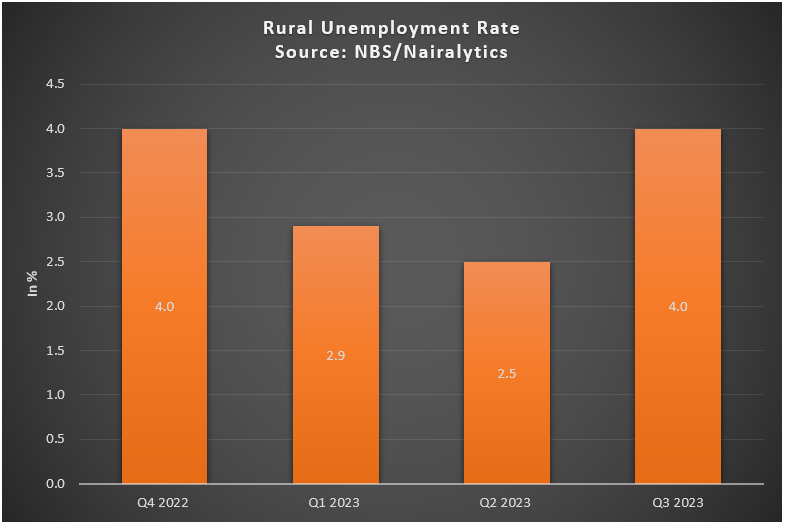The National Bureau of Statistics (NBS) most recent Nigeria Labour Force Survey (NLFS) data show that the rural unemployment rate significantly increased to 4.0% in the third quarter of 2023 from 2.5% in the previous quarter.
The alarming 60% spike in only three months is indicative of a worsening situation, with insecurity in agricultural areas playing a major role in the surge in unemployment.
There seems to be a cyclical pattern in the rural unemployment rate, since the rate reported in Q3 2023 is identical to the rate recorded in the final quarter of the previous year.
This cyclicity raises the possibility that issues impacting rural employment are seasonal in nature or that current efforts to combat unemployment may not be effective in the long run.

Self-employment is higher in rural area
An important metric for gauging the number of people of working age who are actively seeking employment is the labor force participation rate, which the NBS study delves into extensively.
The employment-to-population ratio is greater in rural regions because of the prevalence of agriculture.
This percentage was 71.1% in cities and 80.7% in rural regions in the third quarter of 2023. Compared to urban regions, where 80.3% of the employed are self-employed, rural areas clearly have a higher percentage of employed people working for themselves, mostly in agriculture, at 94.5%.
There is an immediate need for formalization and assistance in rural areas since the informal sector accounts for the vast majority of jobs there (97.2% of rural workers are in the informal sector).
Insecurity and its Impact
Rising insecurity in the agricultural sector, which supports rural economies, is a major contributor to the rural unemployment crisis. Many people lose their jobs, and the unemployment rate rises as a result of conflicts and banditry, which interrupt agricultural production.
The fact that the unemployment rate increased to 5.0% in Q3 2023 from 4.2% in the previous quarter further emphasizes the wider employment issues in Nigeria. Compared to urban regions, rural areas have a lower unemployment rate of 4%. However, the significant rise in rural unemployment is worrisome since it threatens both food security and economic stability.
Lack of safety prevents people from working the land and limits opportunities for rural areas to grow and diversify their economies. Therefore, reinvigorating rural economies and generating long-term job possibilities necessitates tackling these security concerns.
- Nigeria’s security challenges include insurgencies in the northeast, banditry in the northwest, and communal clashes in central regions, severely impacting European operations and questioning the nation’s security strategies despite increased military spending.
- January 2024 experienced a significant surge in violence, with 261 lives lost in nine days due to attacks by terrorists, bandits, and communal violence, alongside the Boko Haram insurgency causing 2 million displacements and extensive property damage over seven years.
- The country faces a record high in kidnappings and nearly 9,000 conflict-related deaths in 2023, with the World Bank and FAO warning of a severe food security crisis affecting millions due to disrupted farming activities.
- The Federal Government and state governors are considering establishing state police to address these issues as part of efforts to improve security, agricultural support, and rural entrepreneurship to tackle unemployment and ensure rural well-being.
- The National Bureau of Statistics (NBS) underscores the dire economic implications of this security crisis, with a significant uptick in rural unemployment threatening national food security and the livelihoods of rural populations.



